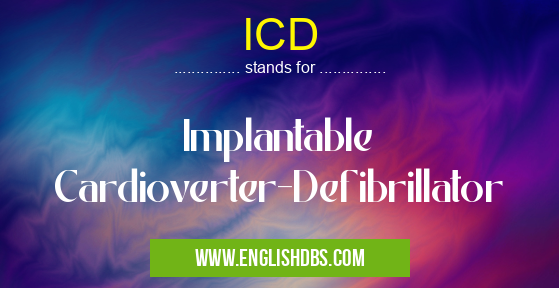What does ICD mean in MEDICAL
An Implantable Cardioverter-Defibrillator (ICD) is a device used to treat life-threatening heart rhythm problems. It is implanted in the body and can help detect and treat arrhythmias, or abnormal heart rhythms. The ICD works by using electrical pulses to help restore normal heart rhythms when needed.

ICD meaning in Medical in Medical
ICD mostly used in an acronym Medical in Category Medical that means Implantable Cardioverter-Defibrillator
Shorthand: ICD,
Full Form: Implantable Cardioverter-Defibrillator
For more information of "Implantable Cardioverter-Defibrillator", see the section below.
Essential Questions and Answers on Implantable Cardioverter-Defibrillator in "MEDICAL»MEDICAL"
What does an ICD do?
An ICD helps detect and treat arrhythmias, or abnormal heart rhythms, by using electrical pulses to restore normal heart rhythms when needed.
Who should receive an ICD?
People who are at risk of life-threatening heart rhythm disturbances may be candidates for an ICD. Your doctor will be able to determine if you should get an ICD based on your medical history and health assessment.
How is an ICD implanted?
An ICD is typically implanted during a surgical procedure in the hospital. A small generator that contains the device electronics is placed beneath the skin in the chest area near the collarbone, while small wires are threaded through veins into your heart to deliver electrical pulses when needed.
What risks come with having an ICD?
There are some risks associated with having an ICD, such as infection, bleeding at implantation site, lead fracture, dislodgement or migration of device components from their original position, and allergic reaction to materials used in construction of the device. However, these risks usually low and can be greatly minimized with follow-up visits and regular check-ups with your doctor after implantation.
Does everyone need regular check-ups after getting an ICD?
Yes! Follow-up visits and regular check-ups with your doctor are important for monitoring how well your device is working and any possible complications from it. It's also important to discuss any changes in medications or lifestyle habits that could affect your device's performance.
Final Words:
An Implantable Cardioverter-Defibrillator (ICD) is a small but powerful device that helps detect and treat abnormal heart rhythms by delivering electrical pulses when needed. While there are some risks associated with getting one, these risks can be greatly minimized through proper care after implantation including follow up visits and regular check ups with your doctor.
